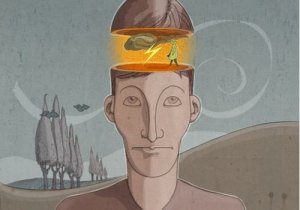Being a Pessimist Has Its Advantages


Written and verified by the psychologist María Vélez
“If you believe that good things will happen to you, they will”. How many times have you heard that phrase? Some people defend positive thinking and the (undeniable) link between optimism and well-being. But what if being a pessimist has its advantages? What if seeing the bad side of things can also be healthy?
Before we begin, we should clarify that being pessimistic isn’t the same as being depressed or being a toxic person. Pessimism, strictly speaking, is related only to the way you calculate and manage your expectations of success.
“Defensive pessimism” refers to a strategy some people with anxiety use to be more productive in their personal and professional life. It consists of lowering your expectations about the future by being aware of all the things that could go wrong. That way, you’re prepared for the worst, which allows you to anticipate what might happen (sometimes).
Imagining the worse helps you avoid being paralyzed by the idea of failure. It also allows you to use pessimism as a way to achieve your goals. Here’s an example. Only a king who admits the possibility of an attack will use peacetime to plan defense strategies to protect his kingdom from future attacks.
Defensive pessimism speaks to your resilience. If you’re overly optimistic, you’ll ignore potential dangers, which could leave you defenseless in risky and stressful situations.

Is being pessimistic good for your self-esteem and health?
A 2008 study on pessimism followed a group of college students for four years. It concluded that those who fit into the “defensive pessimism” category experienced significantly higher self-esteem levels than other students with anxious tendencies.
Their high self-esteem was almost at the same level as that of optimists. That’s due to their ability to anticipate and avoid the worst situations they could imagine.
Frieder R. Lang of Friedrich–Alexander University Erlangen–Nürnberg conducted a decade-long study of older adults. It evaluated the association between optimism and pessimism and the risk of suffering from disability or death. They sent out a survey to German households and the results they noticed were revealing. The researchers said that their study found an association between being too optimistic and always predicting a better future and a greater risk of disability and death.
Dr. Fuschia Sirois, a health psychologist at the University of Sheffield, stated that “When pessimists become chronically ill, their negative view of the future may be more realistic and encourage the sort of behaviors that healthcare professionals recommend for managing their illness”.
She also added that “Pessimists saw their health as getting worse in the future. Taking this view may lead pessimists to engage in the types of coping strategies necessary to manage symptoms such as pain”.
However, they can’t have a negative outlook on everything. In this regard, she stated that “Having said that, this benefit may be best realized when there’s at least some optimism that such strategies will actually work”.

Is being a pessimist a source of peace and satisfaction?
Some well-known thinkers not only defend defensive pessimism but even advocate for generalized pessimism. Alain de Botton, the author of The Architecture of Happiness, argues that we should assume that things tend to go bad in almost every area of existence.
Likewise, he doesn’t believe that this has any negative repercussions on a pessimist’s temperament or life. He argues that pessimism isn’t what leads people to bitterness and anger. Instead, it’s the unsatisfied hopes they have about their job, family, or politics.
“Our capacity for calm ultimately depends on our levels of expectation: if we suppose that most things normally turn out to be slightly disappointing (but that this is OK); that change occurs slowly (but that life is long); that most people are neither terribly good nor very wicked (and this includes us); that humanity has faced crisis after crisis (yet muddled through) – if we’re able to keep these entirely obvious but highly fugitive thoughts alive in our minds, then we stand to be less easily seduced into panic.”
-Alain de Botton-
All cited sources were thoroughly reviewed by our team to ensure their quality, reliability, currency, and validity. The bibliography of this article was considered reliable and of academic or scientific accuracy.
- Pessimism About the Future May Lead to Longer, Healthier Life, Research Finds. (n.d.). Retrieved October 6, 2018, from http://www.apa.org/news/press/releases/2013/02/pessimism-future.aspx
- Santiago, R. (2018). Alain de Botton: “El pesimismo es una de las mayores fuentes de serenidad y satisfacción humana.” Retrieved October 6, 2018, from http://revistasantiago.cl/alain-de-botton-el-pesimismo-es-una-de-las-mayores-fuentes-de-serenidad-y-satisfaccion-humana/
-
Sirois, F. (n.d.). The surprising benefits of being a pessimist. Retrieved October 6, 2018, from http://theconversation.com/the-surprising-benefits-of-being-a-pessimist-91851
This text is provided for informational purposes only and does not replace consultation with a professional. If in doubt, consult your specialist.








